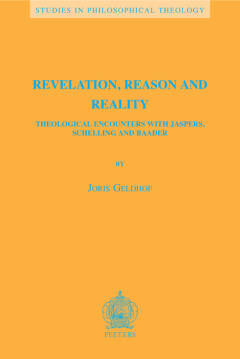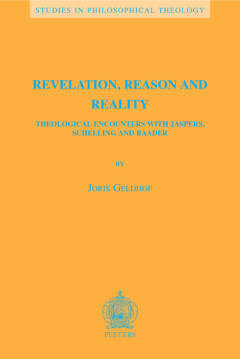
Bedankt voor het vertrouwen het afgelopen jaar! Om jou te bedanken bieden we GRATIS verzending (in België) aan op alles gedurende de hele maand januari.
- Afhalen na 1 uur in een winkel met voorraad
- In januari gratis thuislevering in België
- Ruim aanbod met 7 miljoen producten
Bedankt voor het vertrouwen het afgelopen jaar! Om jou te bedanken bieden we GRATIS verzending (in België) aan op alles gedurende de hele maand januari.
- Afhalen na 1 uur in een winkel met voorraad
- In januari gratis thuislevering in België
- Ruim aanbod met 7 miljoen producten
Zoeken
€ 39,00
+ 78 punten
Omschrijving
This study provides an in-depth analysis of the relationship between modernity and Christianity. The author argues that the notion of revelation is eminently reasonable and indissolubly connected with being and reality. He takes Jaspers' philosophy of religion as representative of the 'classical' modern critique and gives it its due. He then takes a step backward, so to speak, and by means of a consideration of the history of ideas, seeks to rehabilitate the Christian understanding of revelation. To do this, he draws upon Schelling's remarkable philosophy of revelation and Baader's much less familiar speculative dogmatics. However, this study is much more than a profound philosophical and theological account of the thought of Jaspers, Schelling and Baader. It is above all an eloquent defence of the plausibility and intelligibility of what Christians have always believed. In fact, the author makes a compelling case for the claim that revelation is 'that without which Christianity cannot be thought'.
Specificaties
Betrokkenen
- Auteur(s):
- Uitgeverij:
Inhoud
- Aantal bladzijden:
- 200
- Taal:
- Engels
- Reeks:
- Reeksnummer:
- nr. 39
Eigenschappen
- Productcode (EAN):
- 9789042919297
- Verschijningsdatum:
- 30/04/2007
- Uitvoering:
- Paperback
- Formaat:
- Trade paperback (VS)
- Afmetingen:
- 163 mm x 242 mm
- Gewicht:
- 362 g

Alleen bij Standaard Boekhandel
+ 78 punten op je klantenkaart van Standaard Boekhandel
Beoordelingen
We publiceren alleen reviews die voldoen aan de voorwaarden voor reviews. Bekijk onze voorwaarden voor reviews.









